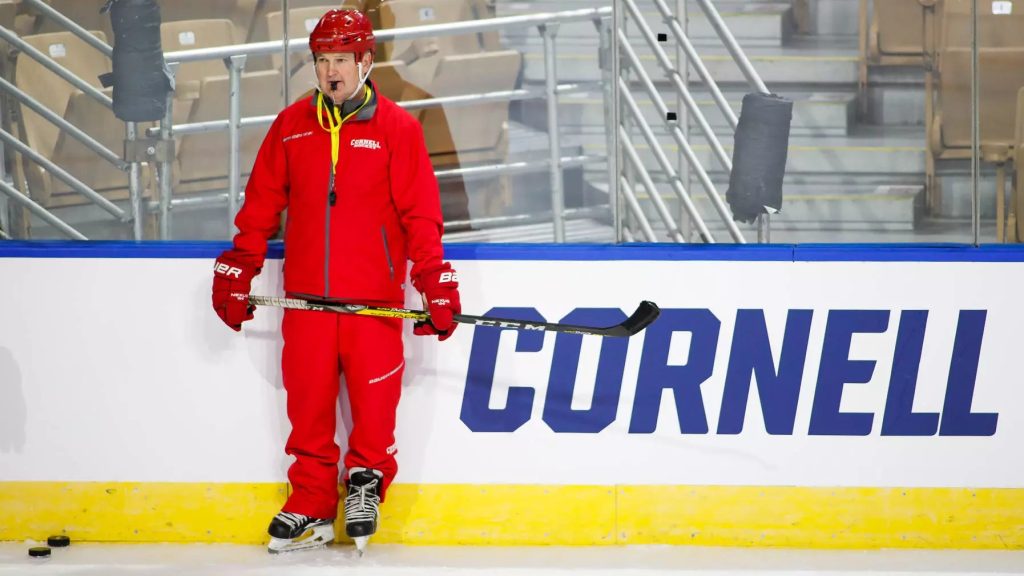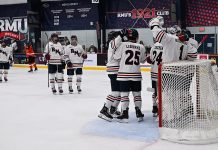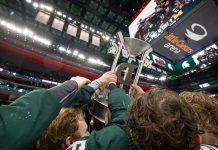
My brother and I used to travel a lot for college hockey.
This was way back in the mid-2000s, an era identified by its lack of available video streaming services. Internet broadcasting was still in its infancy, and Brown, his alma mater and the school for which he’d started broadcasting at the turn of the century, headed to Cornell and Colgate for a road trip historically unkind to the Bears. They hadn’t won both ends of the road trip since the Nixon Administration (or some absurdly similar statistic), so we spent the bulk of the ride telling stories about our worst experiences against opponents.
It inevitably returned to a story from the 1999-2000 season. As a senior, he was Brown’s team manager, and a November trip to Cornell and Colgate offered the first road trip of his season. As an Ivy League school, the Bears started the year at the end of October with a league game against travel partner Harvard before Vermont and Dartmouth ventured south, but the road trip to Central New York loomed especially large because of the Big Red’s overall reputation as a national powerhouse.
Just three years earlier, a 21-win team won a second consecutive ECAC championship under newly minted head coach Mike Schafer. The three years of lower-tier finishes were a distant memory, and even in a league with St. Lawrence and RPI, a trip to play the Big Red and a Colgate team lining the top of the ECAC table was perilous for any team.
Brown was overmatched in those two games during that year and surrendered 15 combined goals to both Cornell and Colgate. The Saturday game at Starr Rink had actually been insanely competitive in a sense that the Bears went back-and-forth with a team bound for the top-10, but the weekend’s opening game at Lynah ended with an 8-1 loss that featured, in my brother’s words, “Give My Regards to Davy [the Cornell fight song] playing over and over until I heard it in my sleep.”
Cornell was a fearsome opponent, and opponents walked into Lynah knowing that they’d lose. It was darker, and the fans knowledgeably hurled insulting chants over the cramped boards. The team wore that red-and-white color scheme akin to the same years ahead of when Ken Dryden broke the hearts of so many Boston Bruins fans.
And the coach. Oh, the coach. As long as Mike Schafer stood behind that bench, Cornell had a chance to score a come-from-behind win. For 30 years, he tortured opponents with the merciless unction of ECAC’s truly elite program. He won, and he won a lot.
And now, as the regular season winds into its final two weeks, the Schafer era prepares for its final act amidst a huge weekend of hockey within ECAC’s race to the end of the regular season.
“I think a lot of things have been the last thing,” said the retiring Schafer ahead of his final regular-season weekend at Lynah Rink. “Our staff kind of joked that this is the last time that I’d do a budget, the last time I’d do scheduling, and the last time I’d do [things]. For me, this weekend is going to be busy because it’s not just about me. I get to have the 1986, the 2005 and the 2010 championship teams returning, so there are going to be a lot of guys that I played with, that I coached, or that I recruited, and I’m looking forward to seeing them come back to celebrate a little bit.
“We’ve been very fortunate to have a lot of great players and great teams, but it still hasn’t really sunk in [that I’m retiring] because I’ve had so much to do with the alumni and everything else that’s occurring. It’s going to be a tough weekend, and I’m sure it’ll be an emotional weekend at the end. But right now, we still just have to grind through the details and get prepared for it.”
Cornell entered this season as the odds-on favorite to replace Quinnipiac atop the ECAC standings, but an 11-8-6 overall record combined with an 8-6-4 mark in conference play cost the Big Red any momentum towards ousting the Bobcats for the Cleary Cup. An early season loss to the Bobcats at home set a tone that continued with a 6-3 loss to Colgate and a 4-0 loss to Arizona State in the Desert Hockey Classic, after which a tie and loss to Sacred Heart ended Cornell’s opportunity for an at-large bid.
Like the rest of ECAC, the second half of Cornell’s season shifted into a conversation about needing to win the conference, and points, already at a premium, became even harder-fought than usual. A pair of losses to Dartmouth and St. Lawrence sent the Big Red tumbling down the ECAC standings ahead of a split against RPI and Union, but last weekend’s six-point weekend sweep over Brown and Yale reminded the league why they were the preseason favorite to challenge for a national spot.
“This weekend was the first time that we played 12 forwards since we played UMass in early January,” Schafer admitted. “There’s been a host of reasons regarding why we haven’t reached expectations, but it’s been a disastrous year for injuries, which has meant we’ve had to change things with how we’re going to play. We were able to practice a lot harder and longer than we normally would at this type of year, but that’s because we had to [balance] having four different types of checks based on our numbers.”
Weird as its sounds, getting healthier enabled Cornell to sneak into the race for a top four spot at a time when the incumbent teams looked to solidify their position under Quinnipiac’s top slot. Nobody had assurances for a national tournament berth, but tying Dartmouth for fifth place pushed the Big Red within a four-point swing of Union and Colgate with Clarkson sitting in second place with a six-point cushion.
What started as blasting Brown with a 5-0 lead en route to a 6-1 victory continued with a come-from-behind rally of sorts after Yale returned fire twice to erase Cornell’s 2-0 lead from the first period. Goals across a seven-minute stretch of hockey from the second period ended the threat, but the emergence of offense from Dalton Bancroft, Jake Kraft and Ryan Walsh showcased depth that didn’t exist when Schafer’s team couldn’t roll full complements of forwards or defensemen towards an opponent.
“We’d been snake-bitten offensively,” he admitted, “and then last week, we went back to focusing on the one thing that we could focus on, which was our defense. We could focus on playing physical and with discipline, so we went out and didn’t make mistakes on the defensive side. We used that to shore up our systems by not whining or complaining that we weren’t scoring, and we focused on the things that we could control.
“Fortunately for us, we were able to score goals, but that’s the mantra we need to carry forward because we can’t get frustrated with things that we don’t control.”
In many ways, the master class was a staple ending to Schafer’s long and storied career. As per usual, Cornell enters its last weekend at Lynah with an absurd home ice advantage. For 30 years, the 11 ECAC regular season championships and 13 postseason crowds hung over the rink as a haunting reminder of the difficulty associated with beating Cornell, and the 26 Ivy League championships from the six-sided subgrouping complemented the 24 different NCAA tournament berths from Schafer’s reign.
Even without the infamous 2019-20 season’s eventual No. 1 seed and a possible run to the national championship (thanks, COVID), the intimidation of facing the Big Red was obvious.
Most intimidating, though, was the understanding that the head coach with 550 career wins wouldn’t ever back down, even as his reputation transformed from the iron-fisted defender of his troops. Now the elder statesman within the league, this is one last opportunity for Cornell to appreciate its success and its 30-year installation into the national spotlight.
And while the league won’t send more than one team to the national tournament, the race for the top four is heightening and tightening right around the one team nobody else wanted to play its best hockey at the end of the season.
“This has made our guys’ mentality tough,” said Schafer. “When you have high expectations and you’re not reaching them, you go through a lull mentally because you sense that something could have been special. Obviously, it hasn’t [lived up to expectations]. Some of it was our own doing and not playing great. Some of it has been the injuries. Some of it has been a lack of consistency. But when you wrap it all up, it doesn’t make a difference.
“We could talk about it, but all we can control, right now, is Clarkson on Friday night. That’s it. We have to come out and play as hard as we can. I haven’t looked at the standings, and I haven’t looked at them for a long time for a lot of different reasons. Where we end up is where we end up. So we need to stay in the moment. It’s cliche, but our guys do a good job of it. We’ve had good, strong, and tough practices, and I think that’s helped us turn the tables a little bit.”


